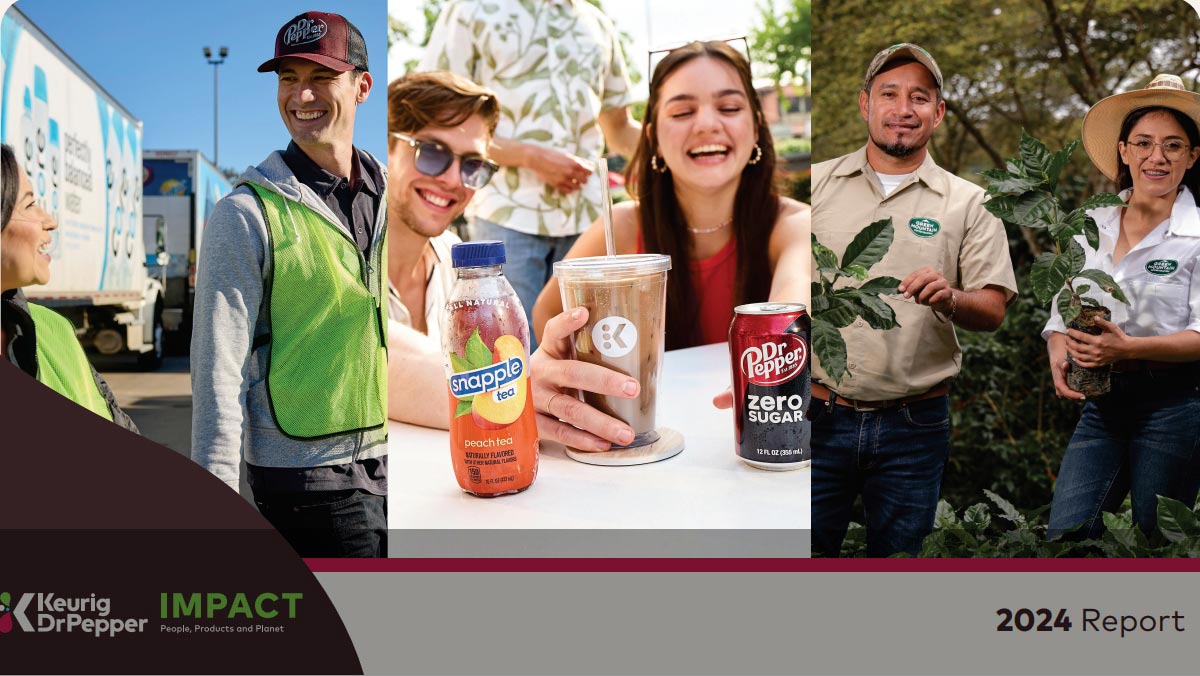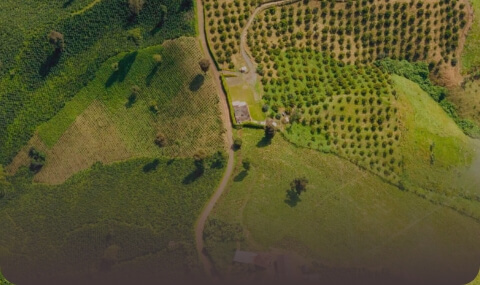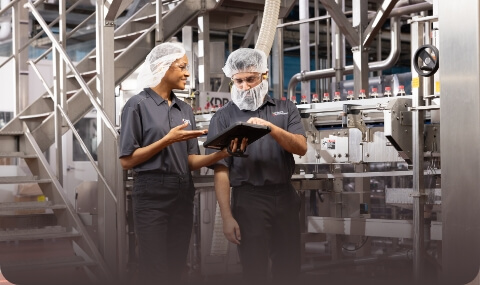Human Rights, Responsible Sourcing & Supply Chain Livelihoods
Strategy
We aim to use our buying power for good through responsible sourcing actions in specific supply chains and strategic work with key suppliers. Central to our work is the recognition that we have a responsibility to uphold and promote human rights for all people and communities impacted by our operations and business activities and, through our procurement practices, we aim to create a dynamic supply chain and support growth in communities by working with a variety of suppliers. In addition, the work we do is intended to position workers and farmers within our value chain to contribute to positive outcomes, such as boosting personal and community well-being and mitigating and adapting to climate change, when they have economic stability and access to financial opportunities.

Respect for the Human Rights of People & Communities Where We Operate

Responsible Sourcing of our Priority Inputs

Economic Resilience of Farmers & Workers in Key Parts of our Value Chain
We recognize that interconnected social and environmental issues require holistic solutions, including shared investment and collaboration with a variety of stakeholders. Partnerships with key producer organizations, suppliers and contract manufacturers, nonprofit organizations and governments are a critical component to our approach.
Management Approach
KDP’s cross-functional teams, including Procurement, Operations, Sustainability, Research & Development (R&D), Human Resources and Legal, collaborate on our approach to source materials and agricultural inputs that meet our established quality requirements, advance sustainability goals and uphold our commitment to human rights throughout our value chain.
KDP has established several policies and statements that reinforce our commitments. These include KDP’s Corporate Code of Conduct, Supplier Code of Conduct, Brazilian Coffee Purchasing Policy, Conflict Minerals Policy and Forced Labor and Child Labor Statement. Our Human Rights Position Statement covers topics including discrimination and humane treatment, freedom of association and collective bargaining, child labor, working hours, wages and benefits, among others.
In addition, KDP is dedicated to transparency, accountability and continuous improvement with respect to human rights. We provide a grievance mechanism open to employees and communities in our supply chain. We encourage stakeholders to report any violations or ethical concerns without delay and without fear of reprisal or concern for retaliation. More information can be found in our Corporate Code of Conduct and Supplier Code of Conduct.
of coffee was responsibly sourced in 2024*
of cocoa was responsibly sourced in 2024

Largest buyer of Fair Trade USA certified coffee for our owned and partner brands in 2024
of our in-scope Tier 1 suppliers and select Tier 2 suppliers for brewers met or exceeded expectations per KDP Supplier Rating System for Factories
Expanded our responsibly sourced audit program to include high-intensity sweeteners in 2024
Number of farmers and workers supported in our coffee supply chain** with the aim to improve their economic resilience per our KDP’s Livelihoods Ambition Monitoring and Evaluation Guide
* In 2024, 0.32% of coffee was received as conventional due to irregular rain patterns delaying the crop in Uganda and logistical challenges resulting from the unavailability of the Suez Canal as a transport route. Both of these challenges required us to purchase green coffee from the spot market to meet our demand, and there were not suitable responsibly sourced options available.
** We estimate that our global coffee supply chain includes over 100,000 farmers, plus many more workers employed on the farms. This means that our products are intricately linked to the work and livelihoods of those people.
We remain steadfast in our commitment to uphold human rights, responsibly source priority inputs and help support the livelihoods of workers and their families in our supply chain as outlined on this page.
- We are members of a number of international initiatives focused on sustainability and human rights, including the United Nations (UN) Global Compact, the Responsible Business Alliance (RBA) and the Global Coffee Platform (GCP).
- We provide a grievance mechanism open to employees and communities in our supply chain and encourage stakeholders to report any violations or ethical concerns without delay and without fear of reprisal or concern for retaliation.
Priority status is determined by the input’s importance to KDP, measured by the magnitude of spending, the social and environmental risk profile of the input and our unique opportunity for impact within the supply chain.
That specific context determines which of our complementary tools and approaches we prioritize to help safeguard fundamental human rights, incorporate environmental protections and/or invest to support the economic resilience of farmers and workers in our priority supply chains. These tools may include risk assessments, verification or third-party certification programs, traceability systems, audits, impact investments and ongoing engagement and collaboration with strategic partners.
2024 Priority Inputs

Apples
- KDP sources whole apples to make Mott’s Applesauce.
- Apples are sourced directly from North American farmers with the vast majority from upstate New York, and a small amount from other regions.

Apple Juice Concentrate
- KDP sources AJC to make certain flavored waters, juices and juice drinks.
- AJC is sourced from a variety of suppliers located in Europe, Latin America and Asia who purchase apples from surrounding supply sheds and then process them into juice concentrate.

Brewers
- KDP sources a variety of components and materials to make our coffee makers.
- Brewer components are sourced from all over the world and brewers are assembled in Malaysia, Thailand, Indonesia and China.

Cocoa
- KDP sources raw cocoa and blended powders containing cocoa for our owned, licensed and partner brands.
- Cocoa is sourced primarily from the Ivory Coast, Ghana and Cameroon, with smaller volumes coming from other cacao-producing countries.

Coffee
- KDP sources coffee for our owned, licensed and partner brand K-Cup pods, whole bean and ground coffee.
- Coffee is sourced from over 20 countries across Latin America, Africa and Asia.

Corn
- KDP sources high-fructose corn syrup for our full-calorie beverages and concentrates.
- High-fructose corn syrup is sourced primarily from the U.S., with a smaller amount sourced from Mexico and Canada.
High-Intensity Sweeteners*
- KDP sources various sweeteners for use in a variety of beverages across our portfolio.
- High intensity sweeteners are sourced primarily from China.

Tomato Paste
- KDP sources tomato paste for our Clamato, Mr & Mrs T products and other tomato-based beverages.
- Tomato paste is sourced from the U.S. and Chile.
*High-Intensity Sweeteners include Acesulfame-K, Aspartame, Erythritol, monk fruit extract, stevia, sodium saccharine and sucralose.
AGRICULTURAL INPUTS
We regard the coffee and cocoa we purchase for our owned and partner brands as Responsibly Sourced if it is grown and sold in adherence to a credible sourcing program that aligns with KDP’s Supplier Code of Conduct and industry-aligned environmental, social and governance criteria.
Our responsible sourcing program for coffee consists of:
- Working with second-party verification and third-party certification partners that have been vetted by the GCP*;
- Requiring the completion of independent, third-party audits on coffee farms to verify compliance with standards and remediation of key issues**;
- Mandating our external partners share standardized data with us on traceability, risk and impact.
We recognize there is no single tool, or combination of tools, that can completely eliminate the human rights risks associated with complex and systemic issues. That is why KDP views verification and certification systems as a valuable starting point but works to invest in impact projects in targeted areas within our supply chains. These projects aim to address the root causes of these issues, such as farmer profitability and climate change.
* As of June 2025, KDP’s accepted partners include Fairtrade International, Fair Trade USA, the Rainforest Alliance, 4C, AtSource Entry Verified by ofi, ECOM SMS, Guaxupe Planet, NKG Verified, RGC Coffee 3E, RSP Advanced by Louis Dreyfus Company, Sucafina IMPACT, Volcafe Excellence, Volcafe Verified. GCP is a multi-stakeholder association that has established a set of principles for global sustainable coffee production and has created a standardized process for assessing sustainable sourcing programs, known as the Equivalence Mechanism.
** Second-party verification and third-party certification partners audit a representative sample of farms. Under the commonly employed industry approach, the baseline number of farms to audit equals the square root of the total number of farms. That baseline can be adjusted up or down based on risk, and each verification or third-party certification partner will approach this differently. The Global Coffee Platform, through its equivalence process, assesses programs to help ensure a robust management system is in place that is fit-for-purpose. For all programs, KDP likewise requires them to disclose their sampling methodology as part of KDP’s approval process.
MANUFACTURED INPUTS
We aim to responsibly source manufactured products and ingredients, such as AJC, brewers, high-intensity sweeteners and tomato paste, by prioritizing and engaging key suppliers to implement and maintain effective social and environmental management systems in their factories.
For these factory-based inputs, we work with our processing facilities, contract manufacturers (Tier 1) and several of our Tier 2 suppliers within the brewer supply chain, applying KDP’s Supplier Rating System. This evaluation structure uses a uniform methodology that enables us to align and rate our suppliers with one audit program.
KDP determines which suppliers are in scope for responsible sourcing audits based on third-party, country- and product-level risk data. All suppliers receive a risk score of Low, Medium or High. In some cases, supplier risk is further refined via a Self-Assessment Questionnaire (SAQ). Factories that have a high-risk score must undergo a third-party audit adhering to one of KDP’s accepted audit standards*. We consider a high-risk factory compliant if it earns an audit rating of Meets or Exceeds Expectations. For any that receive a Below Expectations rating, we work directly with those suppliers to remediate issues and verify corrective actions through additional onsite audits and specific trainings.
We also work with our brewer suppliers to provide training, improve capacity building, safeguard human rights and collaborate on environmental initiatives.
* KDP accepts audit reports from the RBA, Sedex Member Ethical Audits (SMETA), Social Accountability International (SAI) SA8000 and the Business Social Compliance Initiative (BSCI), all of which have created a mechanism to assess responsible business practices in supply chains. In cases where factories have another comparable audit standard, we consider them for approval on a case-by-case basis. In cases where suppliers submit an audit to a standard KDP does not accept, we work with them to undergo a new audit to an accepted standard.
- In 2024, we partnered with Sustainable Food Lab to develop a new methodology, KDP’s Livelihoods Ambition Monitoring and Evaluation Guide, to measure progress.
-
Our progress in supporting the economic resilience of farmers and workers in our value chain is made through long-term relationships with key partners and suppliers.
- 25-year Partnership with Root Capital: KDP and Root Capital have long partnered to support coffee cooperatives to scale and strengthen their operations and become engines of impact in their communities. In 2024, our partnership with Root Capital worked to de-risk and help fill a lending gap for small and growing agricultural businesses that are often excluded from traditional lending systems. Enabled by partners like KDP, Root Capital delivers critical financial and advisory services to help these cooperatives grow into sustainable business enterprises. Since 2000, our efforts have supported more than 170 coffee cooperatives and unlocked more than $500 million in lending to KDP suppliers in communities across Latin America, Africa and Asia. Read more here.
- 10-year Partnership with RGC Coffee: KDP and its supplier, RGC Coffee, have reimagined our commercial relationship as an engine for change to amplify our efforts to improve climate resilience, farmworker protections and farmer income. This blended financing model includes multi-year volume commitments, targeted investment from KDP and funding from coffee cooperatives invested by choice via their Fairtrade premium fund. This model delivers measurable benefits aimed to improve farmer income, soil health or biodiversity within communities in our coffee supply chain. For example, between 2021 and 2024, 330 farmers of the La Vereda sub-cooperative in central Colombia achieved an average increase in net household income of 130% among the farmers who received direct technical assistance, compared to the baseline. Read more here.
- In 2024, we advocated for the five-year reauthorization of the U.S. Farm Bill, an important piece of legislation that supports agricultural economic development, infrastructure and workforce training. The Farm Bill also encompasses critical programs aimed at promoting conservation and encouraging sustainable farming practices, ensuring the long-term resiliency of our agricultural systems. Additionally, it reauthorizes safety net programs, crop insurance and technical support, providing farmers with the resources and security they need to manage risk.






